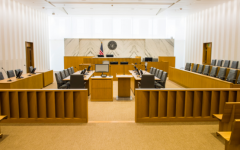
Judge's gavel on courtroom background. Law and justice. (Photo: Zolnierek, Shutterstock)
California Small Claims Court
The small claims divisions have been established to provide a forum to resolve minor civil disputes
By Chris Micheli, February 19, 2025 2:30 am
In Code of Civil Procedure Part 1, Title 1, Chapter 5.5, there is the small claims court and Article 1 deals with general provisions. Section 116.110 names Chapter 5.5 as “The Small Claims Act.”
Section 116.120 provides four legislative findings and declarations, including “in order to resolve minor civil disputes expeditiously, inexpensively, and fairly, it is essential to provide a judicial forum accessible to all parties directly involved in resolving these disputes. Also, the small claims divisions have been established to provide a forum to resolve minor civil disputes, and for that reason constitute a fundamental element in the administration of justice and the protection of the rights and property of individuals.”
Section 116.130 defines the following terms: “plaintiff,” “defendant,” “judgment creditor,” “judgment debtor,” “person,” “individual,” “party,” “motion,” “declaration,” “good cause,” and “mail.”
Section 116.140 specifies that certain provisions of law do not apply in small claims actions.
Article 2 deals with the small claims court. Section 116.210 provides that in each superior court there shall be a small claims division. The small claims division may be known as the small claims court.
Section 116.220 specifies that the small claims court has jurisdiction in five specified actions. Also, in any action seeking relief, the court may grant equitable relief in the form of rescission, restitution, reformation, and specific performance, in lieu of, or in addition to, money damages. The court may issue a conditional judgment. The court retains jurisdiction until full payment and performance of any judgment or order.
In addition, the small claims court has jurisdiction over a defendant guarantor in four specified manners. There are special rules for actions filed by a plaintiff incarcerated in a Department of Corrections and Rehabilitation facility.
Section 116.221 provides that the small claims court has jurisdiction in an action brought by a natural person, if the amount of the demand does not exceed $12,500, except as otherwise prohibited.
Section 116.222 specifies, if the action is to enforce the payment of a debt, the statement of calculation of liability separately states the original debt, each payment credited to the debt, each fee and charge added to the debt, each payment credited against those fees and charges, all other debits or charges to the account, and an explanation of the nature of those fees, charges, debits, and all other credits to the debt, by source and amount.
Section 116.225 states that an agreement establishing a forum outside of California for an action arising from an offer or provision of goods, services, property, or extensions of credit primarily for personal, family, or household purposes that is otherwise within the jurisdiction of a small claims court of this state is contrary to public policy and is void and unenforceable.
Section 116.230 requires the the clerk of the court to charge and collect only those fees authorized under this chapter. If the party filing a claim has filed 12 or fewer small claims in the state within the previous 12 months, the filing fee follows a specified schedule. If the party has filed more than 12 other small claims in the state within the previous 12 months, the filing fee follows a specified schedule. There are additional fees for filing amended claims. Also, each party filing a claim is required to file a declaration with the claim stating whether that party has filed more than 12 other small claims in the state within the last 12 months.
The clerk of the court is required to deposit fees collected under this section into a bank account established for this purpose by the Administrative Office of the Courts and maintained under rules adopted by or trial court financial policies and procedures authorized by the Judicial Council. The Administrative Office of the Courts is required to distribute the fees according to a schedule.
Section 116.231 prohibits any person from filing more than 2 small claims actions in which the amount demanded exceeds $2,500, anywhere in the state in any calendar year. However, public entities are not subject to this limitation.
Section 116.232 requires a $15 charge from the plaintiff for each defendant to whom the court clerk mails a copy of the claim and this fee is distributed to the court in which it was collected.
Section 116.240 authorizes the court, with the consent of the parties who appear at the hearing, to order a case to be heard by a temporary judge who is a member of the State Bar, and who has been sworn and empowered to act until final determination of the case.
Section 116.250 allows sessions of the small claims court to be scheduled at any time and on any day, including Saturdays, but excluding other judicial holidays. And, each small claims division of a superior court with seven or more judicial officers must conduct at least one night session or Saturday session each month.
Section 116.260 requires, in each county, individual assistance to be made available to advise small claims litigants and potential litigants without charge. Section 116.270 allows any small claims division to use law clerks to assist the judge with legal research of small claims cases.
- Relations of LLC Members and Managers - February 24, 2026
- This Is an Interesting Limit on Rulemaking Power - February 23, 2026
- Miscellaneous Civil Action Proceedings - February 23, 2026




